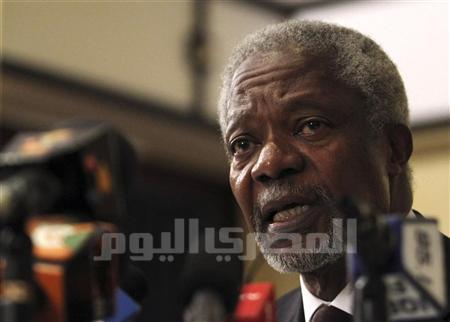
UN-Arab League envoy Kofi Annan arrived in Damascus on Saturday to press President Bashar al-Assad for a political solution to Syria's year-long uprising and bloody crackdown in which thousands of people have been killed.
Airport sources said Annan headed for a hotel after Syrian Deputy Foreign Minister Faisal Mekdad met him at the airport.
Annan's trip to Damascus followed a violent day in which activists said Assad's forces killed at least 72 people as they bombarded parts of the rebellious city of Homs and sought to deter demonstrators and crush insurgents elsewhere.
Arab foreign ministers were due to hold talks in Cairo with Russian Foreign Minister Sergei Lavrov. Russia and China vetoed a UN draft resolution last month which would have backed an Arab League plan calling for Assad to step aside.
Decisive victory has eluded both sides in an increasingly deadly struggle that began as a mainly peaceful protest movement a year ago and now appears to be sliding into civil war.
The United Nations estimates that Syrian security forces have killed well over 7,500 people. Syria said in December that "terrorists" had killed more than 2,000 soldiers and police.
"Immediate ceasefire"
Annan discussed his mission with UN Secretary General Ban Ki-moon and the head of the Arab League, Nabil al-Araby.
"I have very strongly urged Kofi Annan to ensure that there must be an immediate ceasefire," Ban told reporters in New York after the call. After a ceasefire, he said, there should be "inclusive political solutions" found through dialogue.
Annan also plans to meet the Syrian opposition before leaving the country on Sunday. He has called for a political solution, but dissidents say the time for dialogue has passed.
Russia could play a vital role in any push for a managed transition in Syria, although it has resisted Western and Arab demands for Assad to quit, saying no such outcome of negotiations can be predetermined or imposed from outside.
"If (Annan) can persuade Russia to back a transitional plan, the regime would be confronted with the choice of either agreeing to negotiate in good faith or facing near-total isolation through loss of a key ally," the Brussels-based International Crisis Group said in a paper this week.
Chinese and Russian reluctance to approve any UN resolution on Syria stems partly from their fear that it could be used to justify a Libya-style military intervention, although Western powers deny any intention to go to war again in Syria.
Germany suggested Vladimir Putin's victory in Russia's presidential election last Sunday might lead to a policy change.
"I hope that Russia has a clearer view after the election. It is crucial that the UN Security Council gives a clear statement that shows that we stand by the people of Syria and are against violence and repression," German Foreign Minister Guido Westerwelle told reporters at an EU meeting in Denmark.
Russia, an old ally of Damascus and its main arms supplier, has defended Assad against his Western and Arab critics.
A Russian diplomat said this week Assad was battling Al-Qaeda-backed militants, including 15,000 foreign fighters who would seize cities if Syrian troops withdrew.
The Syrian opposition denies any Al-Qaeda role in the uprising, but Islamists are among those who have taken up arms against Assad. The British-based Syrian Observatory for Human Rights said five soldiers were killed when army deserters attacked their troop carrier in the southern province of Deraa.
No equivalence
France said it would not accept any UN Security Council resolution which would assign responsibility for the violence in Syria equally between the Syrian government and the opposition.
"There is no equivalence between the savage repression that Bashar al-Assad's clan has perpetuated for months and the legitimate desire of the Syrian people for the respect of their rights," said French foreign ministry spokesperson Bernard Valero.
Foreign Minister Alain Juppe denied Russian suggestions the West was seeking a pretext for military action: "The option of any military intervention is not on the table," he said.
China, which despatched an envoy to Syria this week, said on Friday it would send an assistant foreign minister to the Middle East and to France to discuss a way forward.
Beijing urged Annan to "push for all sides in Syria to end their violence and start the process of peace talks".
UN humanitarian chief Valerie Amos, who visited Homs this week, said Assad's government had agreed to join UN agencies in a "limited assessment" of civilian needs in Syria, but had not met her request for unhindered access for aid groups.
Syrian officials had asked for more time, she told a news conference in Ankara after visiting Syrian refugees arriving in growing numbers in border camps in Turkey.
Amos said she was "devastated" at the destruction she saw in Homs and that she wanted to know the fate of civilians who had lived in the city's Baba Amr district, which rebel fighters left on 1 March after a 26-day siege.
US Secretary of State Hillary Clinton and Lavrov, her Russian counterpart, will meet in New York on Monday on the sidelines of a special UN Security Council ministerial meeting on Arab revolts, with Syria likely to be a central topic.
Others taking part in the council session are Juppe and British Foreign Secretary William Hague. China will be represented at the ambassadorial level.




